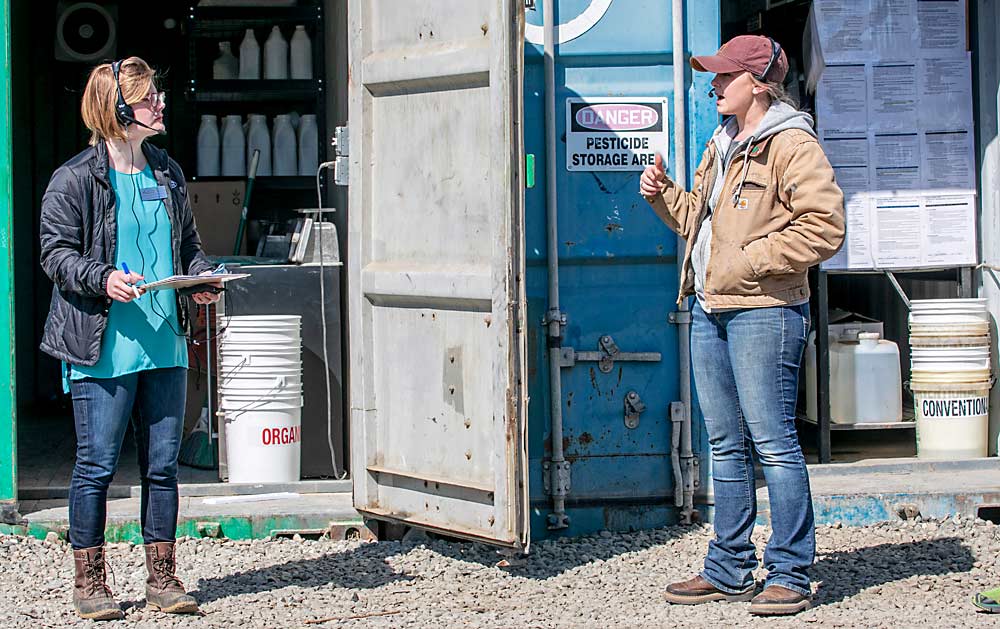This article was written by Kate Prengaman and originally posted on the Good Fruit Grower website. Prengaman is the editor for Good Fruit Grower, writing articles for the print magazine and website. Here, she covers an On-Farm Readiness Review in Grandview, Washington where growers gathered together to learn about compliance with the Food Safety Modernization Act. LFSC received permission from the author to share this article on our website.
In May, grower Leah Eddie made the rare move of inviting her neighbors and a couple of journalists to tag along when the Washington State Department of Agriculture came to her farm to review food safety compliance.
After years of preparation, inspections for larger farms under the Food Safety Modernization Act of 2011, or FSMA, have started this year to ensure produce producers are taking preventative measures to protect against potential foodborne pathogens. Inspections for smaller farms will start next year.
But on Eddie’s Zillah, Washington, farm, the goal was education, not compliance, thanks to a new program known as the On-Farm Readiness Review. Think of it as an informal practice test for the real inspections growers should expect soon.

“The nice thing about it is that it’s completely educational,” said Karen Ullmann, education and outreach coordinator for WSDA’s food safety program.
Washington and many other states are offering the noncompliance “inspection” at no cost to growers, to ensure they are ready for new FSMA inspections. It’s the next step after Produce Safety Alliance Grower Training, she said.
Educational in this case means no photos or written notes, but Ullmann said initial inspections will also focus more on understanding the new rules than on compliance.
“This year, the first inspections are going to be educational, too, so we are not going to write citations unless we see something egregious,” she said. “So, this On-Farm Readiness Review today is very similar to the first inspections for farms.”
Eddie said she wanted to open her readiness review to other growers and food safety managers after hearing some trepidation and confusion about new FSMA regulations at industry meetings. Bleyhl Co-op supported the idea, providing a conference room and shuttle to help people attend Eddie’s review.
“I think it worked. I did talk to a few people afterwards who said, ‘Oh, this is not as scary as it seems,’” she said. “It’s one of those things that the WSDA is more than willing to help you with. They want people not to be scared to call them if you have a question.”
At Eddie Farms, Ullmann asked questions about employee training, hygiene and preventative practices during growing, harvesting and packing — although that section was short since there is no fruit handling on site.

The review started with the toilets. It’s a mobile unit with two toilets, handwashing stations and food safety procedures clearly posted. Inside the stalls, the sexual harassment policies hang on the doors so that they can be read in private, Eddie said.
“We like seeing the soap, the single use towels and the trash cans with lids,” Ullmann said, consulting her checklist. As for recordkeeping, Eddie said she saves the invoices from the company that regularly services the toilets.
Next, Ullmann asked Eddie to explain her employee training approach, when it comes to food safety. The minimum is training upon hiring and once a year thereafter, she said.
Eddie surpasses that, with monthly training focused on timely topics that always include handwashing. At hiring, employees watch food safety videos and then answer questions about the content, she said.
Real FSMA inspections are likely to occur during harvest, when there is produce in the orchards, but during the May review, Ullman asked Eddie to explain the preventative practices used on the farm during harvest.
Eddie explained the protocols for daily inspection of apple picking bags, cherry buckets and workers — to ensure no jewelry poses a contamination risk, for example — as well as the cleaning and sanitation protocol if harvest equipment needs to be cleaned. Bins are visually inspected and are cleaned and sanitized if deemed necessary.

There’s no one-size-fits-all regulation about how often equipment should be sanitized, but rather, inspectors want to see that farms have a protocol in place and follow it, said Faith Critzer, food safety extension educator at Washington State University, who also attended the Eddie Farms review. Cleaning with potable water and detergent first removes the organic matter so that antimicrobial sanitizers can be more effective, she said.
Ullmann asked how workers are trained and encouraged to report potential contamination — from dropped fruit to sick workers.
One of the most contentious components of the FSMA rule, on irrigation water quality testing, remains on hold as regulators try to set standards that are protective but not unnecessarily burdensome for farmers.
“Our recommendation right now is to just keep doing what you are doing to meet global GAP and buyer standards,” Ullmann said. Maps of the farm’s water systems and sources, along with records of annual visual inspections of those systems, would be good to provide to inspectors, she said.
The FSMA inspection will also cover compost and manure applications. Eddie uses cow manure, she said, also known as “untreated soil amendment of biological origin,” in FSMA-speak. The farm’s practice of applying it in late fall after harvest, or in early spring, provides a protective interval from harvest, Ullmann said.
Again, there’s no specific interval in the FSMA rule as it stands now, but it recommends the National Organic Program guidelines, which list a 90-day preharvest interval for manure use in crops, such as tree fruit, that are not in contact with soil. Get records from your suppliers, Critzer suggested, especially if you use certified compost.
“We love written policies, procedures and records,” Ullmann said.
Overall, the mock inspection covered ground similar to the regular audits under Global GAP, Eddie said, so she’s not worried about FSMA compliance.
“I’ve been Global GAP-certified for a number of years now, so it’s not anything new. It’s just one more thing I have to think about and worry about, but it mirrors what I am already doing,” she said. “We’re all aiming toward the same goal, which is food safety and workplace safety.” •
How to sign up for an On-Farm Readiness Review
—In Washington, email [email protected]
—In Michigan, contact Heather Borden, produce safety logistics coordinator at [email protected]
—In New York, contact Steve Schirmer at [email protected] or 518-457-3846
—In Oregon, contact [email protected] or 503-986-4620
—In Pennsylvania, contact Lynn Zakos at [email protected] or 717-787-4315
—In California, contact [email protected] or 916-900-5322
—For other states, more information is available from the National Association of State Departments of Agriculture: nasda.org/foundation/food-safety-cooperative-agreements/on-farm-readiness-review
This article was written by Kate Prengaman and can be found in its original form at the Good Fruit Grower website: https://www.goodfruit.com/state-agencies-offer-readiness-reviews-for-fsma-inspections/. LFSC received permission from the author to share this article on our website.


